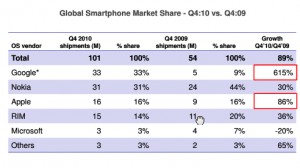“Two turkeys do not make an Eagle”. This was the tweet that Google’s VP Vic Gundotra sent to the world to comment on Microsoft’s and Nokia’s announcement to join forces in the mobile space.
And he may well be right. It is well known that both Nokia and Microsoft are loosing month after month marketshare to Google and Apple. And both companies so far have failed to deliver the innovations that year after year they announce at conferences such as the upcoming World Mobile Congress in Barcelona.
Just some months ago, Nokia continued to clearly advocate for it’s own Symbian operating systems and OVI store, declaring that it would never ever adopt Android, the other “open” option on the market. Short thereafter, Nokia’s Vanjoki resigned, and Stephen Elop became the new CEO. Where did Elop come from? As we all know, Microsoft. Hence the news about the recently announced agreement shouldn’t be a surprise to us. But in any case, fact that “the Windows Phone would serve as Nokia’s primary smartphone platform” is a massive (and probably disruptive) change in Nokia’s strategy, and the further implications for its overall positioning in the mobile marketspace remain unclear.
The New York Times recently reported that both Google and Microsoft were offering the company Millions for an eventual switch to their respective operating systems, Android and Windows Phone.
 Looking at the numbers (see figure) one would have thought that the decision is a no brainer. One platform show positive triple digit growth, the goes straight in the opposite direction.
Looking at the numbers (see figure) one would have thought that the decision is a no brainer. One platform show positive triple digit growth, the goes straight in the opposite direction.
But, of course, everybody is free to make their own decions. We can just hope that the amount of cash offered by Microsoft offsets the obvious doubts that the announcement of the deal has created. Because, going by the numbers, it is hard to understand how Nokia could turn down any offer made by Google. And the market has reacted furiously, with Nokia’s shares falling in double digits.
And hence, the big question will be what to do now. Neither Microsoft nor Nokia can currently show a well-nurtured application ecosystem. And applications, not phones, nor operating systems, are what drives sales. It remains to be seen how the two giants combine forces to convince the market to write applications for the combined Nokia Windows Phones. Nokia has been trying to get this going since at least the launch of their OVI store, and failed. And Microsoft has a similar history, since it hasn’t even gotten to produce enough applications despite a millionary effort of paying application developers to write for their platform.
Nokia’s Elop responded to Gundotra’s tweet quite brilliantly with a “Two bicycle makers, from Dayton Ohio, one day decided to fly.” It remains to be seen if the analogy holds. The Wright brothers invented the plane. Coming from the outside. But does this means that two mobile giants, coming from the inside and having lost significant business to two outsiders will be able to come up with something radically new? And, we should also remember, one of the two brothers died young.



True enough this collaboration may entail a lot of new innovations and ideas, however seeing how the market is buying google and apples more ingenious I guess Nokia and Microsoft should get their acts together and double up their forces to come at par with what the aforementioned has offered the market.
Nokia and Microsoft are now trend followers, but they are not creating anything new. “Two big old fashioned brands” must renew their ideas. They must fight innovation with innovation. That’s the only way to survive in this battleground.
This agreement is done to make some noise in the market, but both companies are wasting the time they don’t have. @jam_sl
Interesting post. Apart from the coopetition issue between the companies, the text shows also the risk related to metaphore-based decision taking.
Depending on which one likes better the alliance may be perceived as two turkey dinner or the beginning of creating the next big thing. The decisions taken based on these metaphors would be quite different. Probably that’s why Shapiro and Varian in ‘Information Rules” declared to prefer models than metaphors.